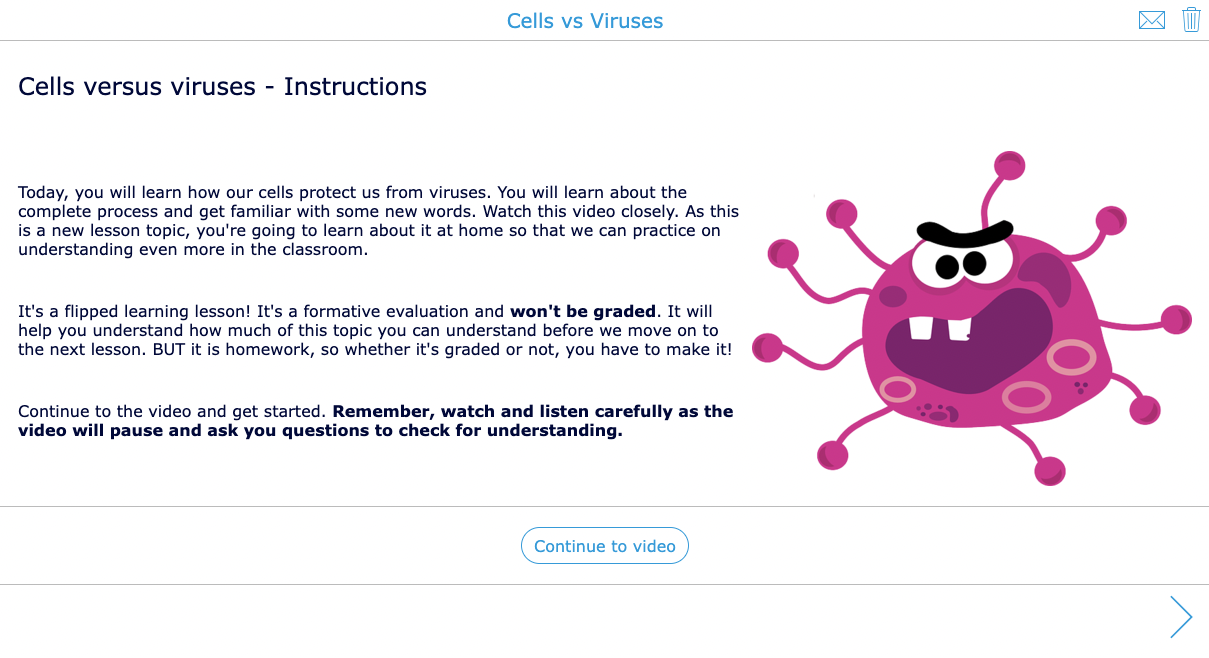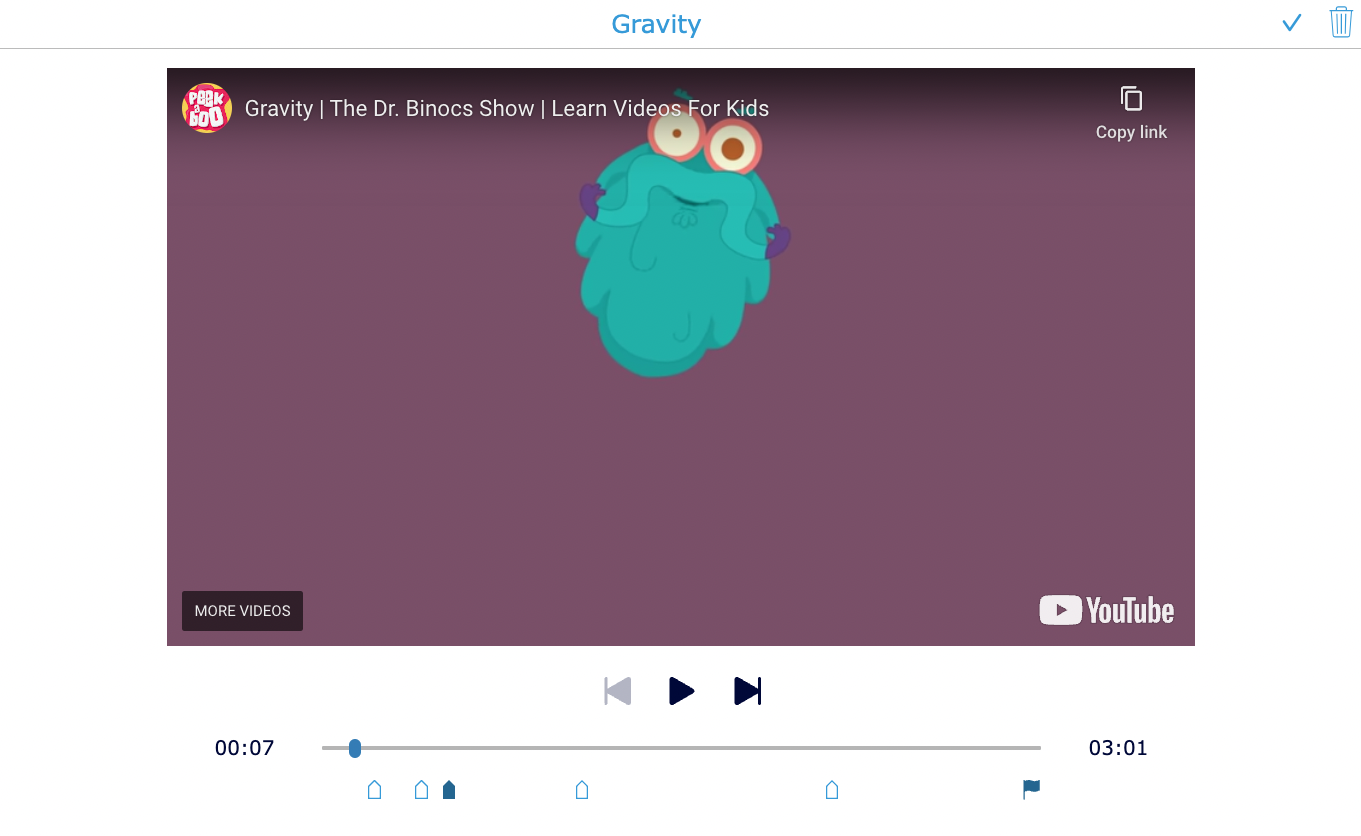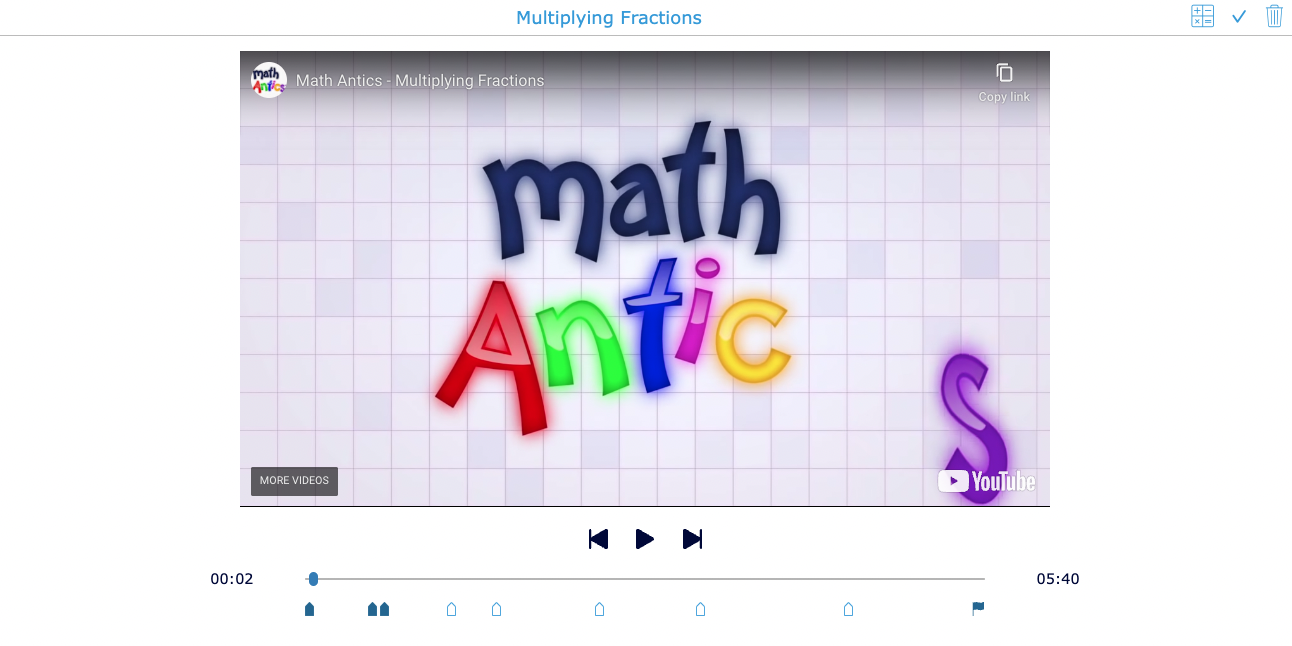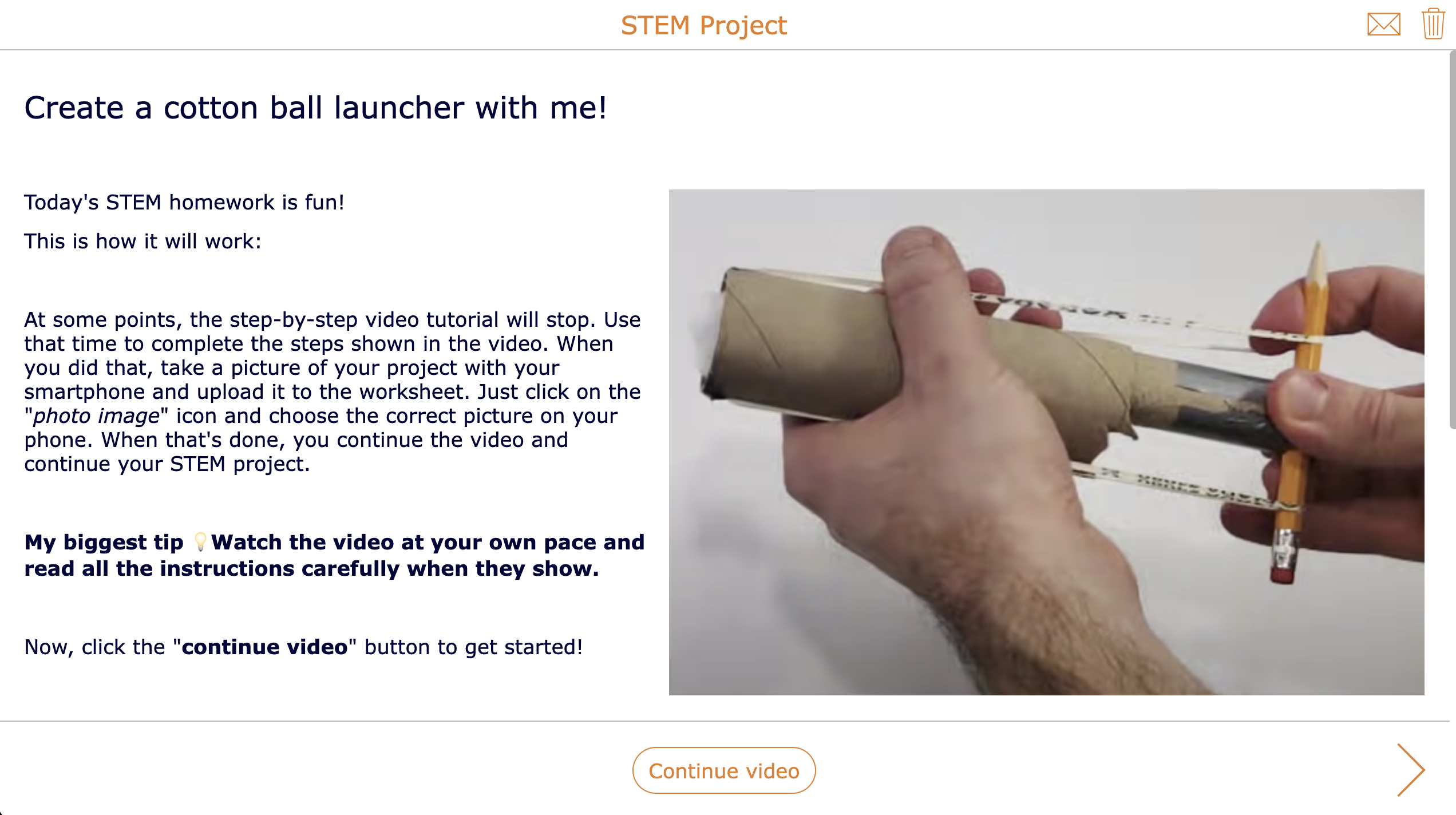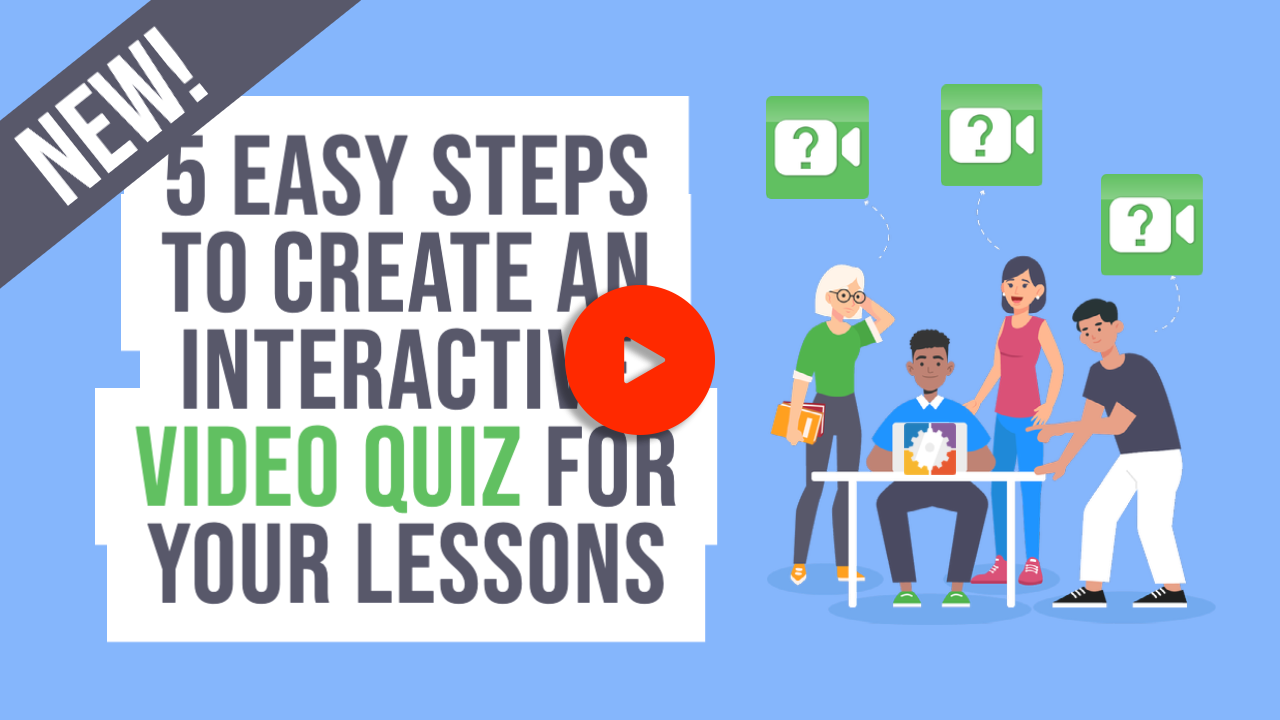10+ Powerful ways to use an interactive video quiz in your classroom
 Lucie Renard —
Lucie Renard —
It has been a while since BookWidgets released a new widget (and no, we’re not counting the Aquarium widget from April 1st 😉). The release of a new widget type is really some BIG news, so get ready…. 3 - 2 - 1 👇
Introducing: the Video Quiz widget! 💥

In this post, we’ll show you all about the Video Quiz in BookWidgets. We’ve included ready-made video quiz activities for you to use immediately! You’ll learn the following:
- What to do with the new video quiz
- 10+ ways to use an interactive video quiz in your lessons
- How to create a Video Quiz: Step-by-step
- How to create a Video Quiz: Video tutorial

What to do with the new Video Quiz widget
What is a Video Quiz?
With the Video Quiz, you can insert questions into a video at various stopping points. You start with a YouTube video, choose the different points where you want to interrupt the video, and use the power of BookWidgets to insert over 30 different types of questions, making your questions video instantly interactive!
For teachers new to BookWidgets: With BookWidgets, teachers can create interactive exercises, games, and auto-graded assignments like; webquests, crossword puzzles, pair-matching games, worksheets, quizzes, and more. If you count the new Video Quiz, BookWidgets now has 42 widget types or interactive activity templates you can use to create digital lessons! BookWidgets can be used for any subject and with students from all ages.
You can easily integrate BookWidgets inside your LMS (Google Classroom, Microsoft Teams, ….) The integration enables you to follow student progress in real time when they are working on a BookWidgets assignment. This is also possible for the new Video Quiz Widget! This way, you can quickly guide your students in the right direction when they need help.
BookWidgets is being used by teachers worldwide for both summative and formative evaluation. The grading dashboard allows teachers to review student work efficiently and easily give comprehensive feedback.
When to use a Video Quiz?
The BookWidgets Video Quiz maker can be used across courses for various purposes. You can use a Video Quiz for flipped learning, to practice language skills, to introduce a new lesson topic, to summarize a lesson, to check for understanding, to deliver explainer videos, to chunk a lesson in small parts, for differentiation, and as an exit ticket. You can probably come up with many more possibilities in your classroom practice! I’m explaining every Video Quiz lesson idea below, with an example you can use yourself.

10+ ways to use an interactive video quiz in your lessons
Go check out these 10+ ready-to-use video quiz lesson examples below. I’ve shared ready-to-use Video Quiz examples you can duplicate, adapt and share with your students. Open the examples and play with them to see how this new widget works! You’ll immediately discover different ways this Video Quiz activity can be used in your classroom. You can find all the video quizzes (and more!) in this BookWidgets group folder. Then, you just need to log in with your BookWidgets account (or create an account first).
1. Flip the classroom
 You can use the Video Quiz for flipped learning for any course or lesson topic. At home, your students watch a video of the new topic. You can immediately ask questions at the right time to check for understanding.
This way, when you’re in the classroom, you can immediately see which students already get it, so they can start practicing and completing exercises. Then, ask the other students that struggled with the questions to come over and give additional instructions to that smaller group before they can start practicing.
You can use the Video Quiz for flipped learning for any course or lesson topic. At home, your students watch a video of the new topic. You can immediately ask questions at the right time to check for understanding.
This way, when you’re in the classroom, you can immediately see which students already get it, so they can start practicing and completing exercises. Then, ask the other students that struggled with the questions to come over and give additional instructions to that smaller group before they can start practicing.
2. Practice language skills
 As video is your media element, you can easily practice language skills like listening. Ask questions at specific times to see if students understand. But there’s more: BookWidgets has an audio recording question. This means that students can practice speaking and listening skills at the same time. Add a video where students get asked questions (listening), pause the video right after and show an audio recording question so students can record their answer to the question with their voice (speaking).
As video is your media element, you can easily practice language skills like listening. Ask questions at specific times to see if students understand. But there’s more: BookWidgets has an audio recording question. This means that students can practice speaking and listening skills at the same time. Add a video where students get asked questions (listening), pause the video right after and show an audio recording question so students can record their answer to the question with their voice (speaking).
👇 Here’s an example 👇
And another one for listening comprehension👇

3. Introduce a new lesson topic
 Interactively introduce a new lesson topic with a video quiz. Play a video about the topic. Remember, your students probably don’t know much about the topic yet. This Video Quiz can be used to introduce your new lesson subject and check your students’ prior knowledge. You could add a few questions during the video and check if students are familiar with the new topic.
Interactively introduce a new lesson topic with a video quiz. Play a video about the topic. Remember, your students probably don’t know much about the topic yet. This Video Quiz can be used to introduce your new lesson subject and check your students’ prior knowledge. You could add a few questions during the video and check if students are familiar with the new topic.
👇 Here’s an example 👇
4. Summarize a lesson
 A new theory or lesson topic can be challenging for students to understand. So it’s essential that students continue reviewing. Repeating a lesson will ensure it sticks to their memory longer, hopefully forever. Another effective learning strategy is dual coding: combining video with audio or text. Cue… the Video Quiz! At the end of your lesson, you summarize the lesson in a Video Quiz widget, asking some essential questions to students, so they have to retrieve the stored information. That’s retrieval practice: another effective learning strategy.
A new theory or lesson topic can be challenging for students to understand. So it’s essential that students continue reviewing. Repeating a lesson will ensure it sticks to their memory longer, hopefully forever. Another effective learning strategy is dual coding: combining video with audio or text. Cue… the Video Quiz! At the end of your lesson, you summarize the lesson in a Video Quiz widget, asking some essential questions to students, so they have to retrieve the stored information. That’s retrieval practice: another effective learning strategy.
👇 Here’s an example of a fun language lesson that summarizes the new vocabulary 👇

5. Check for understanding
 Sometimes, a complex concept is better explained using video. Many videos will help you define a complicated topic, or you can use them as an addition to your explanation. Pause the explanation at certain times to check if students understand the concept.
Sometimes, a complex concept is better explained using video. Many videos will help you define a complicated topic, or you can use them as an addition to your explanation. Pause the explanation at certain times to check if students understand the concept.
👇 Here’s an example of a Video Quiz about multiplying fractions 👇
6. Deliver explainer videos
 Upload your explainer videos to your YouTube account, and set them as “unlisted”. Creating explainer videos or screen recordings is pretty easy. You can use a variety of tools like the built-in QuickTime Player (Mac), Screencastify, Loom, etc. When explaining your topic, pause at moments to see if students are getting it.
Upload your explainer videos to your YouTube account, and set them as “unlisted”. Creating explainer videos or screen recordings is pretty easy. You can use a variety of tools like the built-in QuickTime Player (Mac), Screencastify, Loom, etc. When explaining your topic, pause at moments to see if students are getting it.
Check out the example in which Mrs. Kate Baker explains classroom expectations. When students watch this at home, their parents can also watch it! Involving the parents when you’re explaining classroom expectations is very valuable.
👇 Here’s an example 👇
7. Chunk a lesson for studying
 If you’re teaching all about a prominent theme, for example, WWII, students get a lot of information. You can create lesson resources that split up different parts so students don’t lose the bigger picture. In that case, I suggest you use a Planner or a WebQuest widget with Video Quizzes. Then, students go through the lesson step-by-step and check their understanding again when studying for a big summative assessment.
If you’re teaching all about a prominent theme, for example, WWII, students get a lot of information. You can create lesson resources that split up different parts so students don’t lose the bigger picture. In that case, I suggest you use a Planner or a WebQuest widget with Video Quizzes. Then, students go through the lesson step-by-step and check their understanding again when studying for a big summative assessment.
👇 Here’s an example of a test about the marketing mix! 👇
8. Exit tickets
 At the end of a lesson, you can use a Video Quiz as an exit ticket or exit slip. Just ask your students 3 questions after watching a summary of your lesson. Exit tickets are beneficial to see which students still need more guidance. Then, in your next lesson, you can differentiate instruction and provide guidance or exercises to those students that need a helping hand. Check out the example below to see how you can turn a math lesson about division into an exit ticket.
At the end of a lesson, you can use a Video Quiz as an exit ticket or exit slip. Just ask your students 3 questions after watching a summary of your lesson. Exit tickets are beneficial to see which students still need more guidance. Then, in your next lesson, you can differentiate instruction and provide guidance or exercises to those students that need a helping hand. Check out the example below to see how you can turn a math lesson about division into an exit ticket.
9. Differentiate lessons
 When students solve the questions in your Video Quiz, you can follow up on their activity in real-time using the Live Widgets dashboard in BookWidgets. This way, you immediately see how students are doing on the exercise. You can steer them in the right direction immediately before they even submit their answers. You can also see an average score for each question in your Video Quiz. This shows you what questions students are struggling with. You now also know your next steps in your lesson: elaborate more on that troubling question.
When students solve the questions in your Video Quiz, you can follow up on their activity in real-time using the Live Widgets dashboard in BookWidgets. This way, you immediately see how students are doing on the exercise. You can steer them in the right direction immediately before they even submit their answers. You can also see an average score for each question in your Video Quiz. This shows you what questions students are struggling with. You now also know your next steps in your lesson: elaborate more on that troubling question.
Another way to differentiate with a Video Quiz is immediately providing struggling students with the feedback they need. You’re going to configure automatic feedback messages that are based on a student’s score. Students that score poorly will get remediation exercises. Other students get to move on to more advanced exercises.
👇 Here’s an example of a video quiz with automatic feedback 👇

10. STEM and craft projects
 When students are building their technical and creative skills, they often need guidance to come to the end of the project. A step-by-step video tutorial on the technical aspects of the project is the way to ensure students finish the project perfectly. Take a look at this STEM project Video Quiz to fully understand what I mean. Students have to build a cotton ball launcher as homework for their STEM class.
When students are building their technical and creative skills, they often need guidance to come to the end of the project. A step-by-step video tutorial on the technical aspects of the project is the way to ensure students finish the project perfectly. Take a look at this STEM project Video Quiz to fully understand what I mean. Students have to build a cotton ball launcher as homework for their STEM class.
11. Social-emotional learning
 Social-emotional learning or SEL is the process of developing self-awareness, self-control, and interpersonal skills that are the key to success in life. Whether it be in school, work, or personal life. students with strong social-emotional skills can cope better with everyday challenges. Use a Video Quiz and a short film with a strong social-emotional message to work on these social-emotional skills. A fun way to teach students these skills is through powerful short films.
Social-emotional learning or SEL is the process of developing self-awareness, self-control, and interpersonal skills that are the key to success in life. Whether it be in school, work, or personal life. students with strong social-emotional skills can cope better with everyday challenges. Use a Video Quiz and a short film with a strong social-emotional message to work on these social-emotional skills. A fun way to teach students these skills is through powerful short films.
👇 Here’s an example 👇

How to create a Video Quiz in BookWidgets
If you’re already familiar with a BookWidgets Quiz or (Split) Worksheet, creating a Video Quiz will be as easy as that. If you’re starting with BookWidgets from scratch, you’ll see that for you, this is also a piece of cake! Here are 5 steps you need to follow to create the perfect Video Quiz for your students.
1. Choose the Video Quiz widget
 When you click the most important button in BookWidgets, Create new widget, you open the widget library. Here, you have to choose what kind of widget (or activity) you want to create and share with students later on. You can find the Video Quiz widget in the Test & review category. Click on it and start adding your content.
When you click the most important button in BookWidgets, Create new widget, you open the widget library. Here, you have to choose what kind of widget (or activity) you want to create and share with students later on. You can find the Video Quiz widget in the Test & review category. Click on it and start adding your content.
2. Add a video
 Go to YouTube, and find the URL of the video you want to spice up with questions. You can just copy the link in your browser bar, or click the “share” button just below the video and copy the video link.
Go to YouTube, and find the URL of the video you want to spice up with questions. You can just copy the link in your browser bar, or click the “share” button just below the video and copy the video link.
If the video you want to use is your own (and is therefore not on YouTube or Vimeo yet), you can always upload it to your YouTube account (free) and publish it as “unlisted”. This ensures only people with the link can see your video - and it works in the BookWidgets video quiz! No one will be able to find your video through the search bar or the recommended videos.
Once you have the video link, paste it into the dedicated field in the Video Quiz editor. Your YouTube video will load immediately. ⚠️ Watch out! Not all YouTube videos allow embedding. Some of them just won’t work. And, if your video is longer than 10 hours, we also won’t load the video. That’s just a protection measurement for your students’ brains. 🤓
3. Add your questions on specific timings in the video
 Your video now shows in the Video Quiz editor. You are now able to add your video quiz questions. The video will be interrupted for your students at the time you’ve added one or more questions. There are two possible ways to add questions at specific times:
Your video now shows in the Video Quiz editor. You are now able to add your video quiz questions. The video will be interrupted for your students at the time you’ve added one or more questions. There are two possible ways to add questions at specific times:
- Select a time by dragging the time tag in the progress bar under the video. Then, click Add a question to add a question, which will pop up on the selected time in the video.
- Add your questions first, and move them to the right time in the video by changing the times in front of the questions.
When you click on the button Add a question, a pop-up with all 36 possible question types in BookWidgets will open, where you can choose which types questions to add. You can add one question at a specific time, but you can also add more questions simultaneously, so they will show below each other, such as in a worksheet.
Check out this BookWidgets worksheet with all the possible question types configured already. You can use it as a reminder of what is possible with the question types or inspire other teachers. If you need more help with the configuration of the questions, here’s a YouTube playlist showing you a how-to walkthrough for each separate question type.
To see how your interactive video quiz will look for your students without already sharing it, just hit the Preview button in the upper right corner at any time. The more, the better!
4. Choose your Video Quiz settings
 The content is now ready: you now have a video that stops at certain time points and shows questions. Now it’s time to choose the right settings for your Video Quiz. Every teacher teaches differently and might need different quiz settings. You can enable a calculator, text-to-speech to read questions aloud, immediate correction, automated feedback, a scratchpad for students, disable students to jump forward or backward in your Video Quiz, and much more.
The content is now ready: you now have a video that stops at certain time points and shows questions. Now it’s time to choose the right settings for your Video Quiz. Every teacher teaches differently and might need different quiz settings. You can enable a calculator, text-to-speech to read questions aloud, immediate correction, automated feedback, a scratchpad for students, disable students to jump forward or backward in your Video Quiz, and much more.
Go to the ** General tab** in your Video Quiz and choose the settings your need. Of course, to see how the settings will translate to your Video Quiz, you can always hit the Preview button and test it yourself.
5. Share the Video Quiz with your students
 You now have an interactive video with lots of engaging questions at the right time, in the right place. All you need to do now is to share the Video Quiz with your students. This can be done in various ways:
You now have an interactive video with lots of engaging questions at the right time, in the right place. All you need to do now is to share the Video Quiz with your students. This can be done in various ways:
- LMS integration: This is the best way of sharing a widget or BookWidgets activity with your students. You can connect your BookWidgets account to your favorite LMS, like Google Classroom, Microsoft Teams, Schoology, Canvas, Moodle, Blackboard, itslearning, etc. That way, your students will find the activity within their trusted learning environment, and you will be able to monitor students in real time when they are working on your Video Quiz. Grading will also happen within the LMS, and grades will automatically sync. Take a look at the tutorials I’ve shared for each LMS and reach out to BookWidgets if you want us to make the integration work (for some LMS, you need a special code).
- Link or QR code: When your school doesn’t work with an LMS, you can share widgets through a unique link (or QR code). You can share the link in your presentations, by e-mail, or copy and paste the QR code to put in your paper hand-outs. It will make them so much more fun and interactive! Remember, BookWidgets works on all devices, so your students can just use their smartphones to complete your Video Quiz. The downside of sharing widgets this way is not having the possibility to follow up on students in real time.
Bonus! Review student work
Remember! BookWidgets covers the complete feedback loop. The creating part from the teacher’s side is done, but when you’ve enabled students to submit their answers, make sure to navigate to the Grades and reporting tab in BookWidgets so you can check the Video Quiz answers, give feedback, and return the corrections with feedback to your students. Check this video tutorial to see how you can review student work more efficiently than you ever did before!

How to create a Video Quiz in BookWidgets: video tutorial
If you’re not much of a reader, check out this step-by-step video tutorial on how to create a Video Quiz in BookWidgets from scratch.
Look here for videos about the Video Quiz widget in Dutch and French.
Wrap up
That’s it! I hope you’re absolutely flabbergasted with our new widget and that it will transform your lessons for the better! Remember: you can find all the Video Quizzes (and more!) in this BookWidgets group folder. You just need to log in with your BookWidgets account (or create an account first).
We have one small thing to ask you, though: please, hit the share button on the left of this post and share this news with every teacher you know. 🤓
One second big thing: Have fun and create your first Video Quiz now! 👇
Join the BookWidgets Facebook community or give our new widget a shoutout on Twitter. Anyhow, we’ll meet you there! 👋


